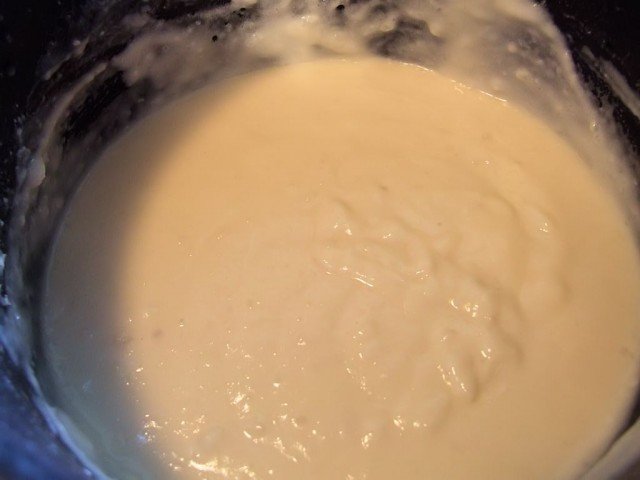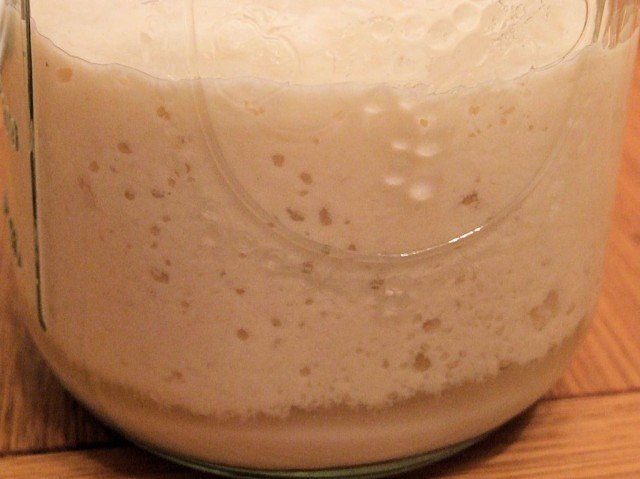I go through phases of making sourdough, and yes I admit it here, that sometimes, I have allowed my sourdough pet to die. I am a bad sourdough parent. Keeping a sourdough pet isn’t difficult and it is far easier than looking after a dog or a cat, since you only have to feed it once a week, and unlike dogs or cats, your sourdough pet will provide you with some of the best bread you have ever tried.
Sourdough is one of the oldest types of bread, and it was created by accident, before humans ever knew of the biology/chemistry that went on inside bread. The two active components of sourdough are lactic acid bacteria and yeast that live in a stable symbiotic culture. The lactic acid bacteria provides the main flavour component of the sourdough and help metabolise some of the sugars for the yeast which produces the gas (CO2) for the dough to rise.
Usually I create a sourdough starter from a little rye flour and water and then leave it for a few days to kick in. This is my guaranteed way of creating a starter, but after seeing a TV show about a bread maker making Pagnotta in Puglia, Italy, I wanted to try a different type of sourdough starter to see if it affect the flavour of the bread. I found a technique that as well as using the basics of flour and water, this sourdough used boiled potatoes, which it said was to help increase the bacterial activity with the additional starch from the potatoes. The process takes a lot longer than my usual method, but the resulting bread has more flavour. However, just like any sourdough starter, once it has been created, it only needs a little care and attention once a week. This is now my favourite sourdough starter until the next one.
How to create a potato based sourdough starter
Ingredients
- One medium potato ~ 5oz (140g), peeled and cubed
- 2 cups (470g) of strong white bread flour
- a pinch of dried active yeast
Method
- Boil the potatoes in 1 cup (115ml) of water until they are soft. Mash the potatoes with the water to make a potato slurry. Leave the potatoes to cool.
- Mix ⅔ of a cup (160g) of the flour and the yeast to the potatoes. Transfer to suitable clean container, such as a large jar, cover and leave in a dark, warm place to ferment for 30 hours.
- Stir the starter and then leave for 24 hours.
- Mix ⅓ of a cup (80g) of flour and 2 tbsp of water to the starter. Leave for another 48 hours.
- Mix ⅓ of a cup (80g) of flour and 2 tbsp of water to the starter. Leave for another 6 hours.
- The starter is now ready to use. Keep the sourdough starter in the refriderator and you must feed it once a week. To feed it, remove ½ cup (120ml) of starter for making bread, give it away, or throw it away, then re-add ¼ cup (60g) of flour and ¼ cup (60ml) of water to the starter.








4 comments
Skip to comment form
The sourdough bread recipe I’ve always used says to add 1cup of starter. It makes 3 loaves. Is there a reason yours says to use 1/2cup of starter?
Author
Cheryl,
When I remove the 1/2 cup of sourdough culture, I then use it to make as much starter as I need to make as many loaves as I need to make. For example I would add about 1 pound of flour, a pint of water, mix and leave it for 12 hours before adding the rest of the ingredients for the bread.
Hello Stuart,
I have been looking for the bread recipe that you use this starter for. Where will I find the link?
Louise
Please give me the recipe for this bread . Thank You Debra